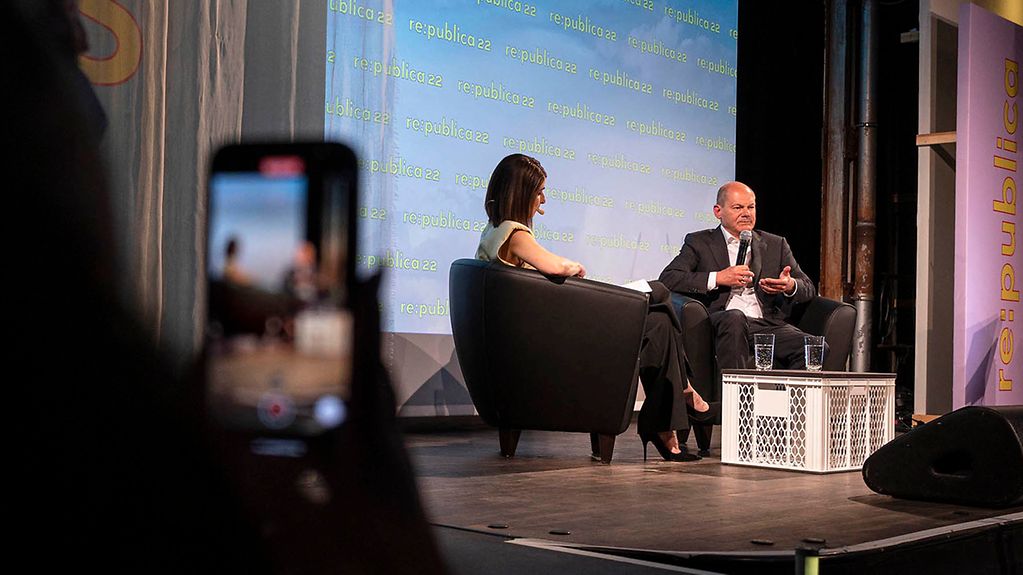Federal Chancellor Scholz at re:publica 2022
Federal Chancellor Scholz spoke about fundamental issues of digital policy at the digital conference re:publica. He announced large-scale investments in digitalisation. “It will be crucial to maintain and strengthen the internet as a progressive, democratising space for global networking and knowledge-sharing,” said the Federal Chancellor.
3 min reading time

“Increasingly, digital technologies are being misused as geopolitical instruments of power, sometimes deliberately to pursue disinformation campaigns,” said Federal Chancellor Scholz.
Photo: Federal Government/Bergmann
At his visit to re:publica 2022 in Berlin, Federal Chancellor Olaf Scholz talked about the opportunities and challenges of digitalisation. Russia’s war of aggression on Ukraine threatened the existing order and had brought about a major upheaval, he said – something that was not only being felt in the analogue world but in the digital sphere, too. “Unfortunately, the internet has to some extent become a splinternet,” said Scholz.
The free internet is under threat
Surveillance, censorship, cyber attacks, disinformation and attempts to block unlimited access by state actors worldwide were a threat to the free internet, said the Federal Chancellor, stressing that this was a consequence of the recent upheaval and at the same time an enormous challenge. For this reason, he said, it was necessary to “maintain and strengthen the internet as a progressive, democratising space for worldwide networking and knowledge-sharing”.
re:publica 2022 is regarded as a festival of digital society. This year it is being held from 8 to 10 June 2022 at Arena Berlin and Festsaal Kreuzberg under the motto “Any Way the Wind Blows”.
Microelectronics as a European success model
The announcement by the US company Intel to produce chips in Germany in the future was good news, said Scholz, especially given the current situation. The Federal Government is seeking to strengthen Germany’s digital independence, though without lapsing into protectionism and isolationism. Scholz said that the fact that the semiconductor manufacturer will be establishing a production site in Magdeburg was not least a fruit of European digital policy, which had been able to mobilise public and private investments amounting to 43 billion euros. The Federal Government will continue to invest in the semiconductor industry in order to strengthen microelectronics as a key technology in Europe.
Large-scale investments in digitalisation
The Federal Government plans to make large-scale investments in digitalisation in the coming years, Federal Chancellor Scholz promised, with the aim of helping Germany catch up with its nationwide expansion of fibre-optic and mobile networks. The responsible use of data is to be established and promoted, as are start-ups. A start-up strategy has been developed for this purpose. A new agency for transfer and innovation will link universities with business and government agencies. Digital administration is to become a reality at all levels.
There was no place on the internet for criminal insults, hatred and agitation – still less incitement to murder, stressed the Federal Chancellor. “The law must be enforced – and that applies equally in the online sphere,” said Scholz. However, this was not a problem the state could solve on its own, he said, and he appealed to the major platforms to show greater awareness of their social responsibility and take effective action in this regard.
Improved media literacy among schoolchildren
There had to be more teaching of media literacy at schools, said the Federal Chancellor, adding that there was a need for a civil society that was well-informed and aware. “Democracy needs discourse and controversy – but ethical guideposts are required, too,” said Scholz.
“We need to embark on a new digital era – and overcome the analogue age!” stressed Digital Minister Volker Wissing at re:publica. He said a comprehensive federal digital strategy would be published in July 2022, adding that it would be subject to assessment based on results. “We’re looking to set down clear objectives in our digital strategy too, stating clearly what we want to achieve and by when,” said Wissing.
The Federal Government’s goal is to triple fibre-optic availability by the end of 2025 with fibre-optics and the very latest mobile phone standards finally reaching every home by 2030. See here for details of the Federal Government’s gigabit strategy (only German).